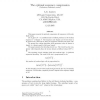Free Online Productivity Tools
i2Speak
i2Symbol
i2OCR
iTex2Img
iWeb2Print
iWeb2Shot
i2Type
iPdf2Split
iPdf2Merge
i2Bopomofo
i2Arabic
i2Style
i2Image
i2PDF
iLatex2Rtf
Sci2ools
DAGSTUHL
2006
2006
The optimal sequence compression
This paper presents the optimal compression for sequences with undefined values. Let we have (N -m) undefined and m defined positions in the boolean sequence V of length N. The sequence code length can't be less then m in general case, otherwise at least two sequences will have the same code. We present the coding algorithm which generates codes of almost m length, i.e. almost equal to the lower bound. The paper presents the decoding circuit too. The circuit has low complexity which depends from the inverse density of defined values D( V ) = N m . The decoding circuit includes RAM and random logic. It performs sequential decoding. The total RAM size is proportional to the log " D( V ) " , the number of random logic cells is proportional to log log " D( V ) " " log log log " D( V ) ""2 . So the decoding circuit will be small enough even for the very low density sequences. The decoder complexity doesn't depend of the sequence length at ...
Related Content
| Added | 30 Oct 2010 |
| Updated | 30 Oct 2010 |
| Type | Conference |
| Year | 2006 |
| Where | DAGSTUHL |
| Authors | Alexander E. Andreev |
Comments (0)

